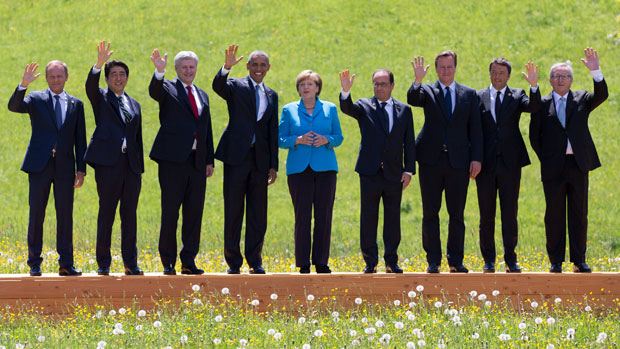New G7 policy 'signals end of fossil fuels'
Environmental groups welcome historic pledge to phase out fossil fuel emissions this century

A free daily email with the biggest news stories of the day – and the best features from TheWeek.com
You are now subscribed
Your newsletter sign-up was successful
G7 leaders have agreed to phase out fossil fuel emissions this century, in a move described as "historic" by environmental campaigners.
At the meeting in Bavaria, leaders from the US, Germany, France, the UK, Japan, Canada and Italy declared that, in line with scientific findings, "deep cuts in global greenhouse gas emissions are required with a decarbonisation of the global economy over the course of this century".
They said they supported cutting greenhouse gases by between 40 per cent and 70 percent of 2010 levels by 2050 – the first time world leaders have endorsed such a precise target, says the Financial Times.
The Week
Escape your echo chamber. Get the facts behind the news, plus analysis from multiple perspectives.

Sign up for The Week's Free Newsletters
From our morning news briefing to a weekly Good News Newsletter, get the best of The Week delivered directly to your inbox.
From our morning news briefing to a weekly Good News Newsletter, get the best of The Week delivered directly to your inbox.
In a third key development, the leaders also reaffirmed a pledge to mobilise $100bn a year from public and private sources to help poorer nations tackle climate change.
Greenpeace said the announcements signal the end of the age of fossil fuels. "The vision of a 100 per cent renewable energy future is starting to take shape while spelling out the end of coal," said a spokesman.
The World Resources Institute, a US environmental group, said: "This long-term decarbonisation goal will make evident to corporations and financial markets that the most lucrative investments will stem from low-carbon technologies."
However, Tim Gore, Oxfam's spokesman on climate change, was sceptical of the finance pledge. "Developing countries need a credible financial road map, not a set of accounting tricks," he said. "Currently rich countries provide just two per cent of what poor countries need to adapt to a changing climate."
A free daily email with the biggest news stories of the day – and the best features from TheWeek.com
Tom Arup, the environment editor of the Sydney Morning Herald, writes that the fossil fuels announcement is not binding and instead "largely symbolic".
The burning of fossil fuels releases CO2 into the atmosphere, the greenhouse gas that scientists say is most responsible for warming global temperatures to potentially perilous levels.
-
 Gisèle Pelicot’s ‘extraordinarily courageous’ memoir is a ‘compelling’ read
Gisèle Pelicot’s ‘extraordinarily courageous’ memoir is a ‘compelling’ readIn the Spotlight A Hymn to Life is a ‘riveting’ account of Pelicot’s ordeal and a ‘rousing feminist manifesto’
-
 The EU’s war on fast fashion
The EU’s war on fast fashionIn the Spotlight Bloc launches investigation into Shein over sale of weapons and ‘childlike’ sex dolls, alongside efforts to tax e-commerce giants and combat textile waste
-
 How to Get to Heaven from Belfast: a ‘highly entertaining ride’
How to Get to Heaven from Belfast: a ‘highly entertaining ride’The Week Recommends Mystery-comedy from the creator of Derry Girls should be ‘your new binge-watch’
-
 Epstein files topple law CEO, roil UK government
Epstein files topple law CEO, roil UK governmentSpeed Read Peter Mandelson, Britain’s former ambassador to the US, is caught up in the scandal
-
 Iran and US prepare to meet after skirmishes
Iran and US prepare to meet after skirmishesSpeed Read The incident comes amid heightened tensions in the Middle East
-
 Israel retrieves final hostage’s body from Gaza
Israel retrieves final hostage’s body from GazaSpeed Read The 24-year-old police officer was killed during the initial Hamas attack
-
 China’s Xi targets top general in growing purge
China’s Xi targets top general in growing purgeSpeed Read Zhang Youxia is being investigated over ‘grave violations’ of the law
-
 Panama and Canada are negotiating over a crucial copper mine
Panama and Canada are negotiating over a crucial copper mineIn the Spotlight Panama is set to make a final decision on the mine this summer
-
 Why Greenland’s natural resources are nearly impossible to mine
Why Greenland’s natural resources are nearly impossible to mineThe Explainer The country’s natural landscape makes the task extremely difficult
-
 Iran cuts internet as protests escalate
Iran cuts internet as protests escalateSpeed Reada Government buildings across the country have been set on fire
-
 US nabs ‘shadow’ tanker claimed by Russia
US nabs ‘shadow’ tanker claimed by RussiaSpeed Read The ship was one of two vessels seized by the US military